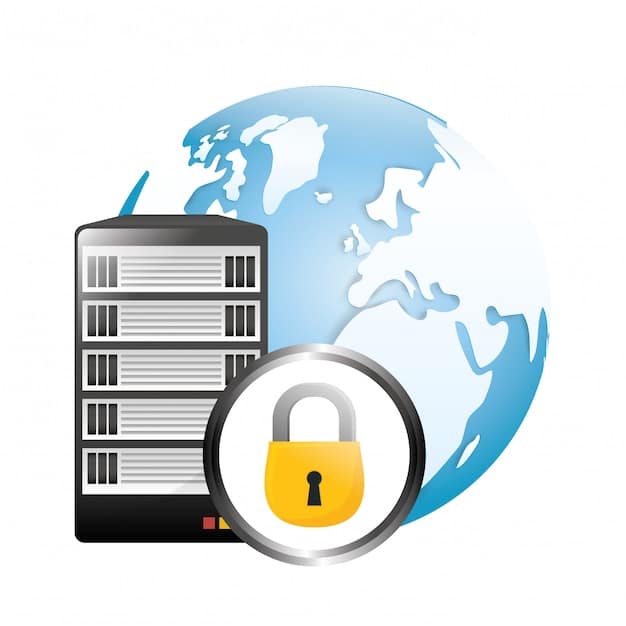Data Breach Alert 2025: Secure Streaming and Protect Your Privacy

A data breach alert for 2025 emphasizes the importance of protecting your privacy while streaming online, as increased digital activity makes personal data more vulnerable to cyber threats.
The convenience of streaming our favorite shows and movies comes with a hidden risk: our personal data. A **data breach alert: protecting your privacy while streaming online in 2025** is essential for anyone who enjoys digital entertainment. Let’s dive into how you can safeguard your information.
Understanding the Rising Threat of Data Breaches in Streaming
Data breaches are becoming increasingly common, and streaming services are prime targets. These breaches can expose your personal information, leading to identity theft, financial loss, and other serious consequences. Understanding why these breaches happen is the first step in protecting yourself.
Why Streaming Services Are Targeted
Streaming platforms collect vast amounts of user data, including payment information, viewing habits, and personal preferences. This wealth of data makes them attractive to cybercriminals. Additionally, many users reuse passwords across multiple platforms, increasing the risk of account compromise.
Common Types of Data Breaches
Data breaches in streaming can take various forms, including phishing attacks, malware infections, and unauthorized access to servers. Phishing attacks trick users into revealing their credentials, while malware can steal data directly from devices. Unauthorized access occurs when hackers exploit vulnerabilities in a service’s security infrastructure.
- Phishing Attacks: Cybercriminals send deceptive emails or messages to trick users into revealing sensitive information.
- Malware Infections: Malware can infiltrate devices and steal data, often disguised as legitimate software or updates.
- Unauthorized Access: Hackers exploit security vulnerabilities to gain access to internal systems and user databases.
The rise of sophisticated hacking techniques and the increasing value of personal data have fueled the surge in data breaches. Streaming services must continually enhance their security measures to stay ahead of these threats.

Key Strategies for Protecting Your Streaming Privacy in 2025
Protecting your streaming privacy requires a multi-faceted approach. By implementing strong security practices and remaining vigilant, you can significantly reduce your risk of falling victim to a data breach. Here are some essential strategies to consider.
Use Strong, Unique Passwords
One of the most effective ways to protect your accounts is to use strong, unique passwords for each streaming service. Avoid using easily guessable passwords or reusing the same password across multiple platforms. A password manager can help you generate and store complex passwords securely.
Enable Two-Factor Authentication (2FA)
Two-factor authentication adds an extra layer of security to your accounts. When enabled, you’ll need to provide a second form of verification, such as a code sent to your phone, in addition to your password. This makes it much harder for hackers to access your accounts, even if they obtain your password.
- Password Managers: Use a reputable password manager to generate and store strong, unique passwords.
- 2FA Options: Explore different 2FA methods, such as SMS codes, authenticator apps, or hardware security keys.
- Account Recovery: Ensure your account recovery options are up-to-date to regain access if your account is compromised.
Staying proactive with password security and 2FA can significantly enhance your protection against unauthorized access and data breaches.
The Role of VPNs in Securing Your Streaming Experience
A Virtual Private Network (VPN) can play a crucial role in securing your streaming experience. By encrypting your internet traffic and masking your IP address, a VPN can help protect your privacy and prevent eavesdropping. Here’s how VPNs work and why they are beneficial.
How VPNs Enhance Security
VPNs create a secure tunnel between your device and the internet, encrypting all data that passes through it. This encryption prevents third parties, such as hackers or internet service providers, from intercepting and reading your data. Additionally, VPNs mask your IP address, making it harder to track your online activities.
Choosing the Right VPN
When selecting a VPN, consider factors such as its security features, server locations, speed, and privacy policy. Look for VPNs that offer strong encryption, a no-logs policy, and a wide range of server locations to ensure optimal performance and privacy.
- Encryption Standards: Opt for VPNs that use strong encryption protocols, such as AES-256.
- No-Logs Policy: Choose a VPN with a strict no-logs policy, ensuring that your browsing activity is not recorded.
- Server Locations: Select a VPN with servers in multiple locations to bypass geo-restrictions and improve performance.
Using a VPN can add an extra layer of security to your streaming activities, protecting your data from prying eyes and potential breaches.

Staying Updated on Streaming Service Security Measures
Streaming services are constantly evolving their security measures to combat emerging threats. Staying informed about these updates and adjusting your security practices accordingly is essential for maintaining your privacy. Here’s how to stay in the loop.
Following Security News and Updates
Keep an eye on security news and updates from reputable sources. Many streaming services announce security enhancements and data breach alerts through their official websites, blogs, and social media channels. Subscribing to cybersecurity newsletters and following industry experts can also provide valuable insights.
Adjusting Your Security Practices
As streaming services update their security measures, review your own practices to ensure they align with the latest recommendations. This may include updating your passwords, enabling new security features, or adjusting your privacy settings.
- Official Announcements: Monitor official announcements from streaming services for security updates.
- Cybersecurity Newsletters: Subscribe to reputable cybersecurity newsletters to stay informed about emerging threats.
- Regular Reviews: Regularly review and update your security practices to align with the latest recommendations.
By staying informed and proactive, you can ensure that your security practices remain effective and up-to-date.
Monitoring Your Accounts for Suspicious Activity
Even with robust security measures in place, it’s important to monitor your accounts for suspicious activity. Early detection of unauthorized access or fraudulent transactions can help minimize the damage and prevent further exploitation. Here’s what to look out for.
Recognizing Potential Indicators of a Breach
Be vigilant for signs of suspicious activity, such as unexpected password reset requests, unauthorized purchases, or unfamiliar devices logged into your account. Regularly review your account activity and report any suspicious activity to the streaming service immediately.
Taking Immediate Action
If you suspect that your account has been compromised, take immediate action. Change your password, enable 2FA, and contact the streaming service’s customer support team to report the incident. Monitor your financial accounts for any unauthorized transactions and consider placing a fraud alert on your credit report.
- Account Activity: Regularly review your account activity for unfamiliar devices or unauthorized purchases.
- Password Resets: Be wary of unexpected password reset requests and verify their authenticity.
- Fraud Alerts: Consider placing a fraud alert on your credit report if you suspect identity theft.
Prompt detection and action can help mitigate the impact of a data breach and protect your sensitive information.
The Future of Streaming Security in 2025 and Beyond
As technology evolves, so do the threats to streaming security. Looking ahead to 2025 and beyond, it’s important to anticipate future trends and prepare for emerging challenges. Here’s what the future of streaming security may hold.
Emerging Technologies and Threats
New technologies, such as artificial intelligence and blockchain, could play a significant role in enhancing streaming security. AI could be used to detect and prevent fraudulent activity, while blockchain could provide a secure and transparent way to manage user identities and access rights. However, these technologies could also be exploited by cybercriminals, creating new threats.
Preparing for Future Challenges
To prepare for future challenges, streaming services and users must invest in advanced security measures, such as biometric authentication, zero-trust architectures, and enhanced data encryption. Collaboration between industry stakeholders and cybersecurity experts is also essential for staying ahead of emerging threats.
- AI and Machine Learning: Explore the potential of AI and machine learning for detecting and preventing fraud.
- Blockchain Technology: Consider the use of blockchain for secure identity management.
- Advanced Security Measures: Invest in biometric authentication and zero-trust architectures to enhance security.
By embracing innovation and prioritizing security, the streaming industry can create a safer and more trustworthy experience for users in the years to come.
Protecting your privacy while streaming online in 2025 requires a proactive and informed approach. By understanding the risks, implementing strong security practices, and staying updated on emerging threats, you can enjoy your favorite content with peace of mind.
| Key Point | Brief Description |
|---|---|
| 🔒 Strong Passwords | Use unique, complex passwords for each streaming service. |
| 🔑 Two-Factor Authentication | Enable 2FA for an extra layer of security. |
| 🛡 Use a VPN | Encrypt your internet traffic and mask your IP address. |
FAQ
▼
A data breach is when unauthorized individuals gain access to sensitive data. For streaming users, this can mean stolen passwords, financial details, or personal information that can lead to identity theft.
▼
A VPN encrypts your internet connection, hiding your IP address and making it harder for third parties to track your streaming activities or intercept your data, enhancing your overall privacy.
▼
Immediately change your password, enable two-factor authentication if available, and contact the streaming service’s customer support to report the potential breach for assistance.
▼
Using the same password across multiple services means that if one account is compromised, all accounts using that password are at risk. Unique passwords limit the potential damage.
▼
Follow cybersecurity news outlets, streaming service blogs, and cybersecurity experts on social media to stay informed about new threats and the latest security recommendations to protect your data.
Conclusion
In conclusion, safeguarding your streaming privacy in 2025 necessitates a blend of vigilance, strong security habits, and the use of privacy-enhancing tools like VPNs. By staying informed and proactive, you can enjoy your favorite content while minimizing the risk of data breaches and privacy intrusions.





